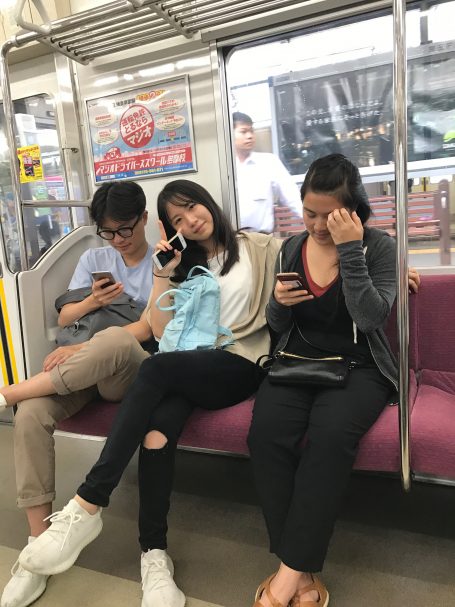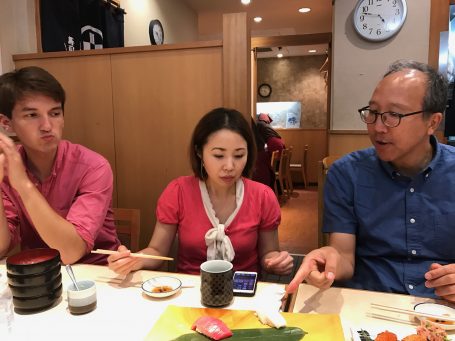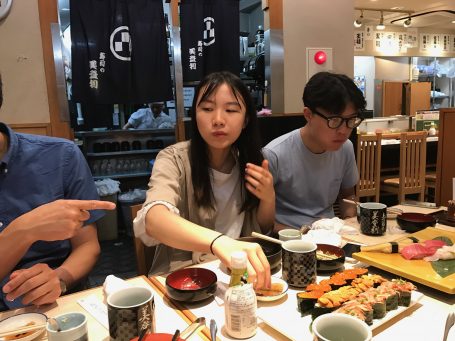By: Sam
We started the day at Tokyo University. The campus was lovely with beautiful trees and old buildings. We ate at their cafeteria, which was not only cheaper, but miles ahead of EVK. We met with Professor Yaguchi for a fascinating talk on gender inequality and the college system in Tokyo. We learned that the college process for Japanese high school students is vastly different from the American process. Rather than spending their time trying to work hard to keep up their GPAs, round out their application with extra-curricular activities, cozy up to teachers to get stellar recommendations, and cram for SATs, SAT IIs, ACTs, and APs, to get into Tokyo University students take a single entrance exam. The top 3,000 scorers are accepted, and nothing else is considered. Of course, at Tokyo University, they would argue that this is the fairest system. But Professor Yaguchi has some complaints.
The first problem is that Tokyo University becomes practically inaccessible to international students. The entrance exam is based on the Japanese high school curriculum and if students have not taken this curriculum, it would be incredibly difficult. It would also require international students to fly to Japan which isn’t possible for many. Professor Yaguchi had to argue to the university to allow international students to be admitted in a more “American” holistic style of college admissions. There has been an attempt to attract more international students by hiring more international professors, and creating a B.A. program in English, but there is still push-back from the university in further globalizing the school.
The second big problem he has with the entrance exam and the admissions process at Tokyo University is the rampant gender inequality. Toyko University is about 82% male. The management team argues that there’s not really anything they can do as their entrance exam is (at least in theory) gender blind. Professor Yaguchi sees this as a weak excuse. Because not only are women not being accepted, but they’re not even applying. Of the tenured professors, only 5% are women. Even in fields dominated by women like pharmacy, most of the teachers are still male. Women might not feel welcome on a campus so dominated by men both in the student body and the faculty. There is also great stigma in Japanese society associated with women who attend Tokyo University. They’re seen as too smart and therefore undesirable. The social circles are made up of men from Tokyo University and women from other universities; Tokyo University women are explicitly banned. This issue has been brought up to the university as discrimination, but Tokyo University feels very strongly in not interfering with their students, particularly in their social lives. Compared to schools in the West and even schools in Asia, Tokyo University’s gender equality is starkly behind.
But Tokyo University is falling behind internationally. The main reason is has fallen in the rankings is its failure to integrate international students. Tokyo University, which regards itself as the best school in Japan, has begun to fall behind other schools in Asia. If the ranking systems decided to include gender equality as a factor, it would fall even sharper. But why is the university so reluctant to change? Tokyo University feels that it’s first in the nation and doesn’t need to adapt to globalization.
After the heady talk, we all certainly needed a big meal. We had an amazing, massive meal, at Midori sushi. Platter after platter of fresh delicious sushi came out. We were all absolutely stuffed and couldn’t even finish the incredible sushi – as badly as we wished there was more room in our stomach.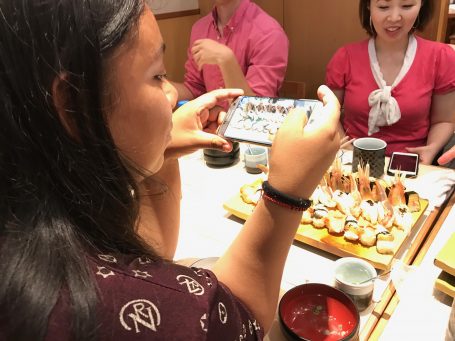
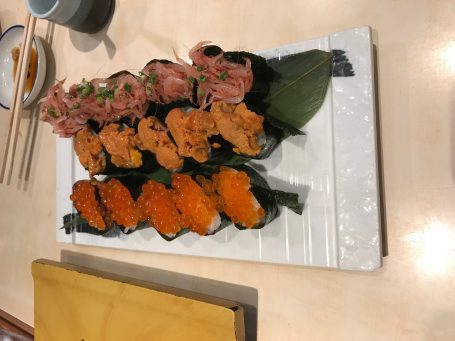
We ended the day with a quiet meeting with a few of our Meiji supporters and finished up our research presentations.
